The late 20th century was marked by the collapse of socialism, alterations in the political map of the world, and the appearance and deterioration of a number of problems related to different spheres of public life. Due to the lack of attention to moral and ethical values along with economic, ecological, and demographic problems, the problems of morality even deteriorated. Besides the theory of the clash of civilizations based on religious differences emerged and found its supporters at that time. Some separatist groups used religious dogmas for proving themselves right in their activity.
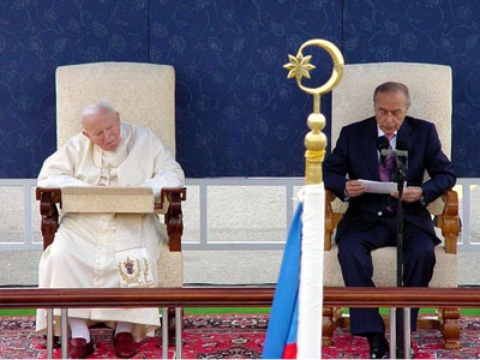
Under such conditions, the establishment of a dialogue between nations and cultures was important for the protection of various cultures of humanity. The experience of countries and regions rich in the traditions of tolerance and patience could serve as an example in this connection. The peaceful coexistence of a number of nations and religious confessions in Azerbaijan is a unique pattern of tolerance.
These traditions come from ancient times: the Jews running away from the Jewish kingdom, ruined as a result of the occupation of Jerusalem by Babil ruler Novukhodonosur the Second (586 B.C.) found refuge on the territory of Azerbaijan. According to the historical data, Babil captured nearly 40 thousand prisoners.
The first followers of Christianity settled in Azerbaijan in the first century A.C. and laid a foundation of the Albanian autocephaly church that later was set up there. The traditions of tolerance even strengthened with the spread of Islam on the territory of Azerbaijan. The Muslim tolerance bases on the suras and citations from the holy book Koran. According to historians Muslims displayed tolerance and patience to Judaism, Christianity, and Zoroastrian trends in the 7th-8th century.
The common fate of numerous ethnic and religious groups residing on the territory of Azerbaijan played a great role in the establishment of strong contacts between them. Peoples residing in Azerbaijan through the whole of its history repeatedly fell under the dependence on other strong states and the established situation obliged them to get closer despite differences in views.
The collapse of the Soviet Union turned into a hard ordeal for traditions of religious tolerance in the region. As a result of this process, the peoples of the former union republics gained liberty of faith along with independence. Since the beginning of 1992th, during the 30 years, the Armenian occupation caused death to thousands of innocent people and making millions of our compatriots flee their houses, threatened the tolerance peculiar of Azerbaijan. Though the Azerbaijani-Armenian conflict did not have a religious ground the religious leader of Armenia Vazgen the First was in fact one of the inciters of the separatist movement.
The irreconcilable Armenians tried to spread a myth in the international arena that Islam in Azerbaijan threatens peace. On the other hand, some forces tried to convert the Muslim population of the republic into Christianity for spreading anti-war and even pro-Armenian tendencies. No doubt that such a movement did not serve the strengthening of a dialogue between religions. Yet these processes could not have a decisive negative impact on relations between religious confessions. These relations improved after Heydar Aliyev had come to power.
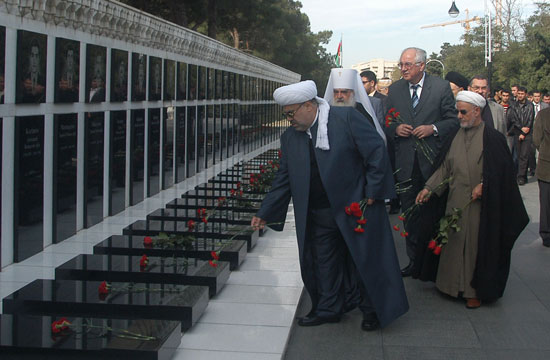
At the international symposium on the Islamic civilization in the Caucasus President Heydar Aliyev said: "There are a number of religions in the world and each of them occupies its own specific place. We Azerbaijanis being proud of our Religion-Islam, have never displayed a negative hostile attitude, towards other religions, never been at enmity, and never obliged other nations to practice our religion. On the whole, Islam is notable for tolerance to other religions and coexistence in conditions of mutual understanding with other religions. This process has been registered both in Azerbaijan and in the Caucasus. Christianity and Judaism existed and currently exist in Azerbaijan along with Islam. We consider people of any religion or nationality should respect other cultures, religions, and moral values and be patient with unpleasant traditions of other religions.
All religious confessions are equal before the law and have the same status in frames of the model of state-religion relations of present-day Azerbaijan. Along with ensuring the rights of Muslims constituting the majority of the country citizens, the government of Azerbaijan takes care of other religions spread in the country as well. Thus, the building of the head church Djen Mironosets, shutdown in 1920 was delivered to the Russian orthodox church in 1991. All-Russia and Moscow patriarch Alexei the second, staying on visit in Azerbaijan, declared this temple holy and attached the status of the cathedral church to it on May 27, 2001. Moreover, another orthodox temple-the head church of Saint Maria was restored in the capital city in 1999-2001.
The Catholic community of our country is also attached a great deal of attention by our state. After Azerbaijan’s restoration of state independence, the Catholic community was able to resume its activities. On April 2, 1999, the Roman Catholic religious community of Baku was registered by the state. Also, by order of National Leader Heydar Aliyev, an area was allocated for the construction of a Catholic church in Baku. Consequently, a Catholic church was erected in honor of Mother Mary in the most attractive part of the country’s capital in 2007. And in 2011, the religious organization Apostolic Prefecture of the Catholic Church in the Republic of Azerbaijan was registered by the state.
In our country, Catholicism comes after Orthodoxy and Protestantism by the number of followers. Despite its small size, the Catholic community in our country takes an active part in public life and engages in charitable activities. A homeless shelter named after Mother Teresa, the Mary Education Center, and other charitable facilities operate under the Apostolic Prefecture of the Catholic Church in the Republic of Azerbaijan.
Currently, there are eight places of worship (five churches, two chapels, and one prayer house) administered by the Baku and Azerbaijan Eparchy. Four of them are located in Baku, and the rest are situated in Ganja, Sumgayit, Khachmaz, and Lankaran.
The cultural heritage of the country's Jewish community which has ancient traditions is also attached a great deal of attention by the government of Azerbaijan. The organization for relations between Azerbaijan and Israel and the society Soxnut had been operating in the country since 1990.
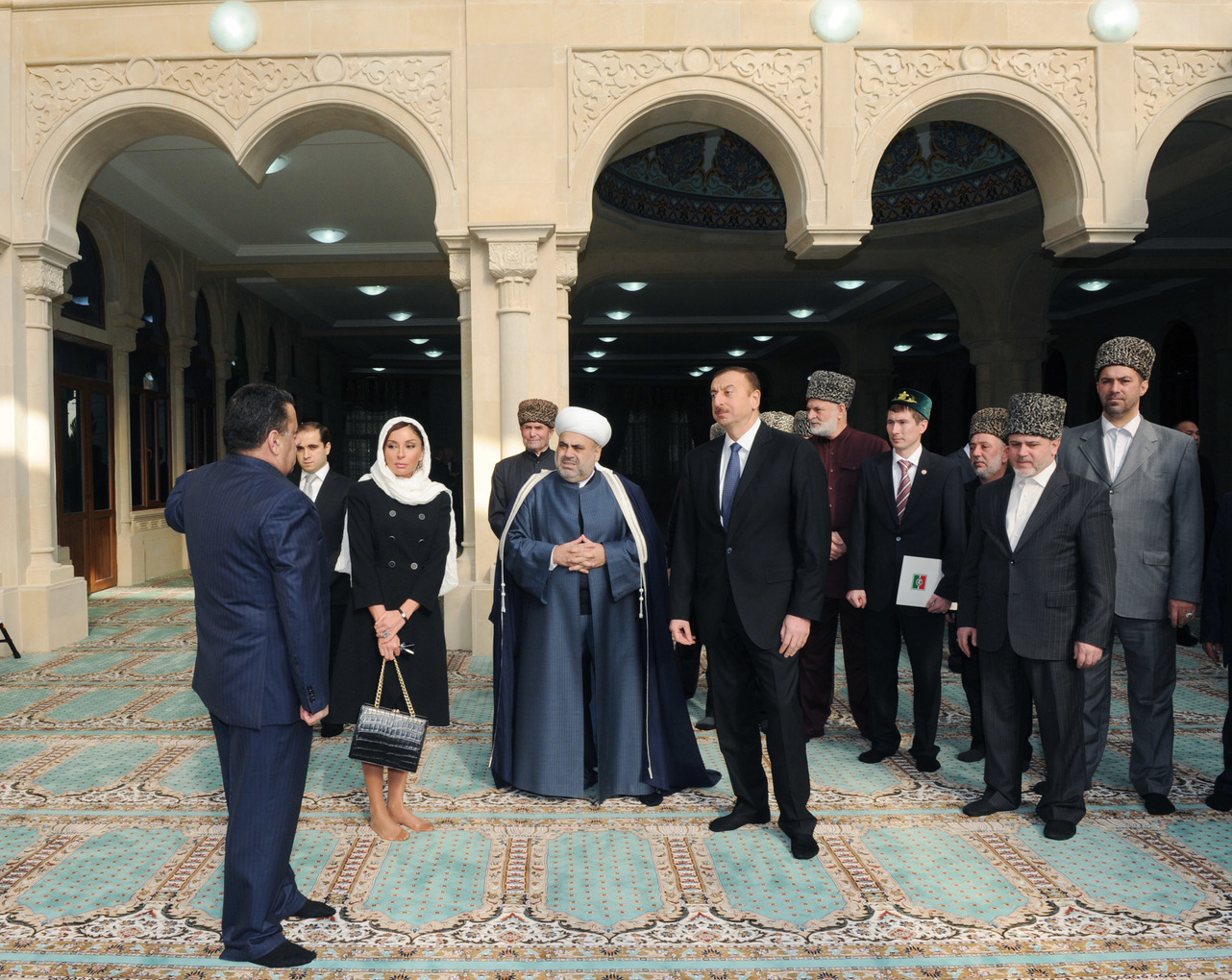
When speaking about the history of Mountain Jews in our country, it is necessary to mention the Girmizi Gasaba (Red Settlement) in the Guba district. Because this settlement is considered a place in the post-Soviet space densely populated by Mountain Jews. Located on the left bank of the river Gudyalchay, the Girmizi Gasaba was founded in the 18th century during the period of Guba Khanate. The settlement, which was earlier called the “Jewish settlement”, was once famous even as the “Jerusalem of the Caucasus”
As for the situation of the Jews in modern Azerbaijan, it should be noted that they live mainly in Baku, Ganja, and Sumgayit cities, as well as in Guba and Oghuz districts. The Jewish communities present in our country are surrounded with attention and care by the Azerbaijani state. The construction of a new synagogue for the Mountain Jews religious community of Baku at the initiative of President Ilham Aliyev is a good example of it. The synagogue, whose foundation was laid in 2010, was made available for believers in April 2011. In addition, every year the President of the Republic of Azerbaijan congratulates the Jewish community of our country on the occasion of the Jewish New Year, i.e. Rosh Hashanah holiday.
The Heydar Aliyev Foundation and the Ohr Avner Foundation have built the Chabad Ohr Avner Education Center for Jewish children living in Baku within the framework of the project “Azerbaijan: Address of Tolerance”. The foundation laying ceremony of the Center was held with the participation of Mehriban Aliyeva, the president of the Heydar Aliyev Foundation, on May 31, 2007. The construction of the Education Center was finished in 2010. On October 4, 2010, Azerbaijani President Ilham Aliyev, his wife Mehriban Aliyeva, and Lev Leviev, the President of the Federation of Jewish Communities of the CIS and the Ohr Avner Foundation, attended the grand opening of the Education Center.
Furthermore, the Hebrew language is taught at Baku State University, as well as a secondary school No.46 named after Agabey Novruzbeyli in classes consisting of children of Jewish origin within the Russian department of the school.
It should also be noted that today the Jewish communities in Azerbaijan actively participate in public life through the Azerbaijan-Israel Friendship Society, the Jewish agency Sochnut, the major Jewish charities Joint and Vaad-I-Hetzola, the Humanitarian Association of Azerbaijan’s Jewish Women, Jewish religious schools (yeshivas), the Azerbaijan-Israel Cultural Relations Society, the women’s society Eva and other Jewish NGOs operating in the country.
According to the official website of the State Committee of the Republic of Azerbaijan for the Work with Religious Organizations, there are seven synagogues and eight Jewish religious communities in the country.
Thus, in the modern age, Jews in Azerbaijan live in a tolerant environment free from anti-Semitism, which is no coincidence because Jews have felt like an equal member of the large family in our country throughout all historical periods and even in times of rampant anti-Semitism around the world, the people of Azerbaijan did not treat them as aliens, on the contrary, our compatriots of Jewish origin lived in an atmosphere of friendship, solidarity, and mutual understanding.
The historical tolerance and patience formed in Azerbaijan had turned to one of the properties typical of the Azerbaijani society. It should be mentioned that the national government constantly meets with the leaders of religious communities and displays interest in their problems and needs. President Ilham Aliyev always delivers congratulating speeches on the occasion of the major religious holidays of Christians and Jewish people.
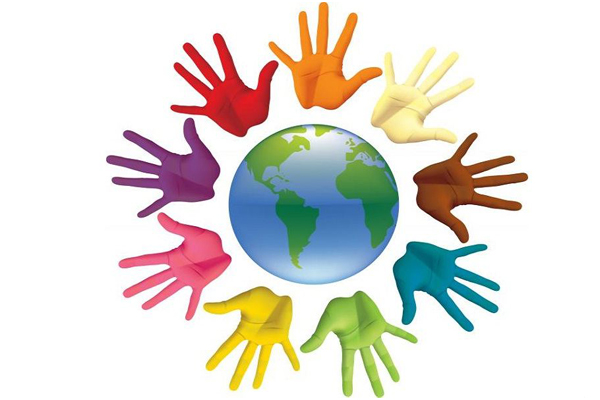
GOVERNMENT AND RELIGION — The essence of multiculturalism
Multiculturalism can be defined as different cultures be united, not in a single or superior way, but in conjunction with equal rights. In this regard, the legal regulation of rights and freedoms of different religions, ethnic groups, and cultures is of great significance. These rights are superior in Azerbaijan and guaranteed with Constitution. If we check our Constitution's relevant provisions, we can clearly see the government`s policy towards `the protection of the differences` in Azerbaijan.
Article 18. Religion and the state
I. Religion in the Republic of Azerbaijan is separate from the state. All religions are equal before the law.
II. The spread and propaganda of religions (religious movements) that humiliate human dignity and contradict the principles of humanism shall be prohibited.
In the country, there was created a strong legal base for further development of tolerance, which is characteristic of our people. The right of freedom of conscience of our citizens is directly fixed in the Constitution, and has found broader reflection in the Law “On religious freedom”. According to Article 48 of the Constitution, each citizen has freedom of conscience, the right to freely formulate his attitude towards religion, express and extend the views connected with any religion and carry out religious rites. Besides, for strengthening religious tolerance in the country, the legislation connected with the rights and freedoms of the person, including freedom of conscience and religion was brought in compliance with the international law.
For the purpose of regulation of the relations between the state and religion, as well as control of observance of the legal acts connected with religious freedom, in 2001, there was signed the Decree on the creation of the State Committee on Work with Religious Associations.
November 16 in Azerbaijan and in the whole region is marked as the International Day of Tolerance.
According to the statistics, about 96 percent of the population of Azerbaijan are Muslims, 4% - Christians, Jews, bahaists, Krishnaites, and representatives of other religions. About 60-65 percent of Muslims of the country are Shias, while 35-40 percent are Sunnis. In the country, practically there are all currents of Christianity. In Azerbaijan, there live the Christian parishioners of Orthodox, Catholic, Lutheran, and Protestant churches, and parishioners of the historical Albanian church.
Currently, 941 religious communities are registered with the State Committee for Work with Religious Associations. 906 of them are Islamic, 24 of them Christian, 8 of them Jewish, 2 of them Baha`i, and 1 is a religious community of Krishna consciousness (2020).
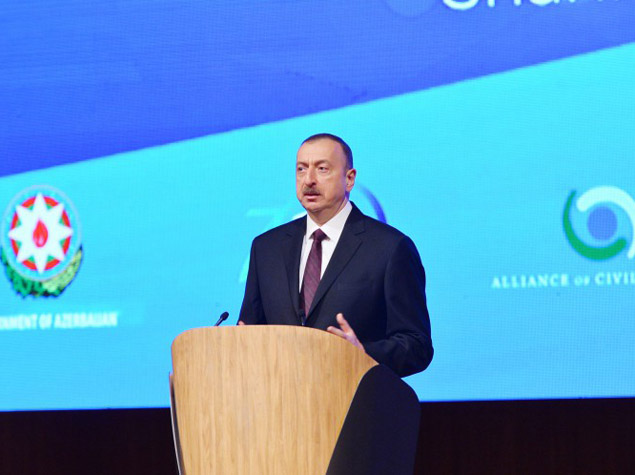
The policy of the Republic of Azerbaijan pursued in the sphere of religion is constructed on the principles of freedom of thought, speech, and conscience, taking into account various forms of existence of religion in society. At the same time, the policy of the Azerbaijani state in the field of religion is based on the principles and rules of international law, international treaties the participant of which the Republic of Azerbaijan is, the Constitution of the country, and other normative-legal acts.
The Azerbaijani government holds a set of events for the development of tolerance, multiculturalism, inter-confessional and inter-cultural dialogue with the participation of the different parties. Over the last ten years, Azerbaijan became the host country of tens of international and regional conferences, forums, and symposiums devoted to these questions. We can proudly state that today in the international arena two expressions connected with the city of Baku are very often used: The Baku process on intercultural dialogue and the Baku process for the promotion of intercultural dialogue and tolerance.
Besides, for the purpose of dissemination and promotion of its experience in the sphere of tolerance and multiculturalism, and for promotion of these values in the international arena, Azerbaijan closely cooperates with the authoritative organizations, including with the UN, OSCE, UNESCO, ICESKO, and other structures.
One of the important actions, from the point of view of promotion on the international arena of the state policy of Azerbaijan in the field of religion and support of Azerbaijan to the interreligious and intercultural dialogue, as well as dissemination of its experience in the sphere of tolerance, was the Baku Summit of the world religious leaders taken place on April 26-27, 2010. The Government of Azerbaijan has undertaken to finance of this Summit organized on the initiative of the Caucasus Clerical Office of Moslems and the Russian Orthodox Church. Representatives of the influential religious centers of the world, including heads of the Russian Orthodox, Georgian Orthodox, and Armenian Gregorian churches, influential religious figures of the Vatican, the Constantinople Patriarchy, and the Islamic world, attended the summit.
The World Forum on Intercultural Dialogue, organized and hosted by Azerbaijan, was, undoubtedly, one of the most prestigious actions in this sphere. So far, Baku has hosted five World Forums on Intercultural Dialogue and every time it was successful, with worthy achievements. This Forum is known in the international arena as “The Baku Process” is considered one of the authoritative world actions, which are regularly carried out.
One of the international events held in Azerbaijan was the I Baku International Forum on the subject: “State and Religion: Strengthening Tolerance in a Changing World”. The event participants adopted a document named The Baku Platform containing common principles in the mentioned sphere. During the Forum with the participation of the representatives of more than 30 world countries, it was decided to regularly hold this forum.
On December 1, 2016, a conference titled “Traditions of religious tolerance in the Caucasus and Azerbaijan’s model of multiculturalism” held in Baku. Members of the Supreme religious council, state and religious figures, representatives of the Russian Orthodox Church and the Georgian Orthodox Church, and ambassadors of different countries have attended the conference with the chairmanship of Allahshukur Pasazade who is the chairman of the Caucasus Muslims` Board. It became clear from the goals and objectives of the conference that Azerbaijan's tolerance model is now being studied at 28 universities around the world. The value which unites the people of the Caucasus is a value derived from tolerance. There is also a tolerance in the tradition of the Azerbaijani people. Today, tolerance in Azerbaijan has been raised to the level of government policy.
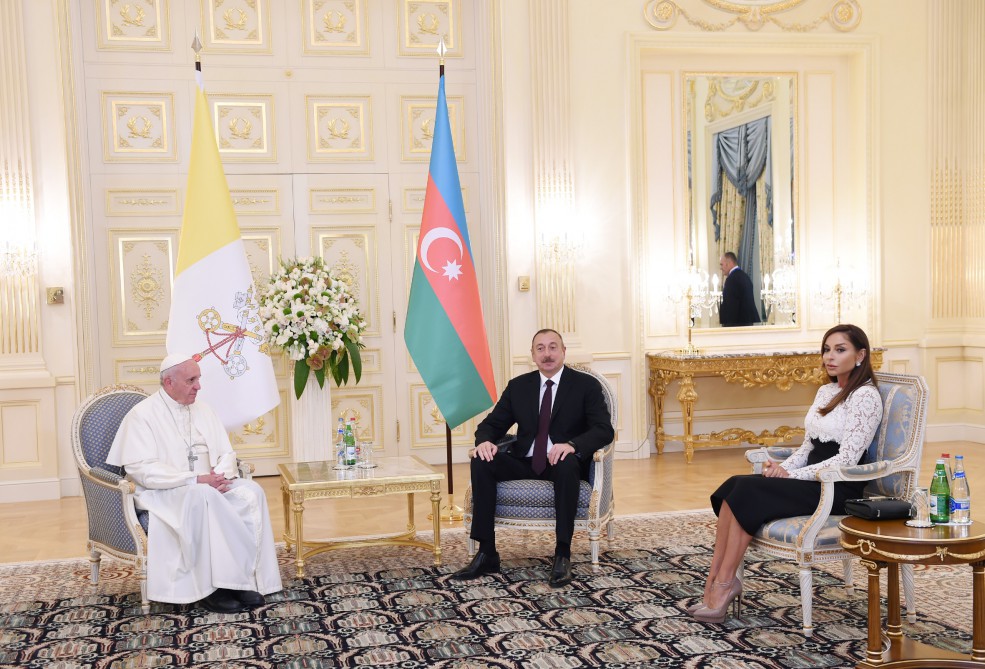
On October 2, 2016, Pope Francis visited the Republic of Azerbaijan. During a meeting with Pope Francis, President Ilham Aliyev announced this year's "Year of Multiculturalism" in Azerbaijan. "Multiculturalism is both a way of lifestyle and a policy of our government for us. Azerbaijan plays a crucial role in terms of the promotion of the ideas of multiculturalism in the world. Unfortunately, some figures, politicians, and leaders share pessimistic thoughts towards multiculturalism and claim that multiculturalism has failed and has no future. These thoughts are wrong and very dangerous. However, we proved that multiculturalism lives and develops in Azerbaijan and takes our country forward. Azerbaijan is one of the addresses of multiculturalism. We are proud of being a multicultural, multi-confessional country and representatives of all religions in Azerbaijan live with dignity".
On December 21-22, 2017, an international conference was held in Baku on "Year of Islamic Solidarity: Interfaith and intercultural dialogue".
Co-organized by the Caucasus Muslims Office and the State Committee on Work with Religious Organizations, the conference marked the completion of the "Year of Islamic Solidarity". State, religious figures, and scientists from nearly 40 countries with almost 150 representatives, heads and representatives of eight international organizations, special envoys of heads of states of a number of countries, heads of religious communities, members of government and parliament, and representatives of the diplomatic corps participated to the conference.
Heydar Aliyev Foundation is actively involved in the protection of natural and spiritual values, and restoration of historical and religious monuments. Over the "Address of Tolerance Azerbaijan" project, Heydar Aliyev Foundation implements numerous projects in our country.
In today`s world, Heydar Aliyev Foundation does not only contribute to the preservation of Azerbaijan but also, preservation of the world`s cultural heritage, intercultural and civilizational dialogue. Over the "Azerbaijan — the address of tolerance" project, the Heydar Aliyev Foundation restored the architectural monuments of the Palace of Versailles and stained glass windows of the cathedral in Europe. It shows Azerbaijan`s contribution to tolerance and respect for the diversity of world cultures and shows that Azerbaijan has strong, ancient roots of tolerance. Mehriban Aliyeva who is the first lady of Azerbaijan has signed important work on the restoration of 60 catacombs around Rome city. Holy Marchellino and Pietro catacombs are one of the important and fascinating monuments to the Christian world and restoration of these monuments was written in history as another brilliant example of interfaith and cultural dialogue. Heydar Aliyev Foundation carried out a historical mission with its contribution to the restoration of such prestigious archaeological monuments. In France, Heydar Aliyev Foundation`s assistance to the restoration of 7 churches of the 10th and 12th centuries in the settlement of Santia, Fresnay o Sovaj, San Iler la Gerard, Tanville, Courjust, Revoyne, and Mal of the French Orne Department has also become real within the "Azerbaijan - Address of Tolerance" project.
Currently, the Heydar Aliyev Foundation has begun to work on a project to restore religious monuments and mosques in the liberated territories. With the participation of local and foreign experts, restoration, conservation, and reconstruction of our shrines are carrying out in the Karabakh region. These religious monuments and mosques are the national wealth of the population of Azerbaijan.



